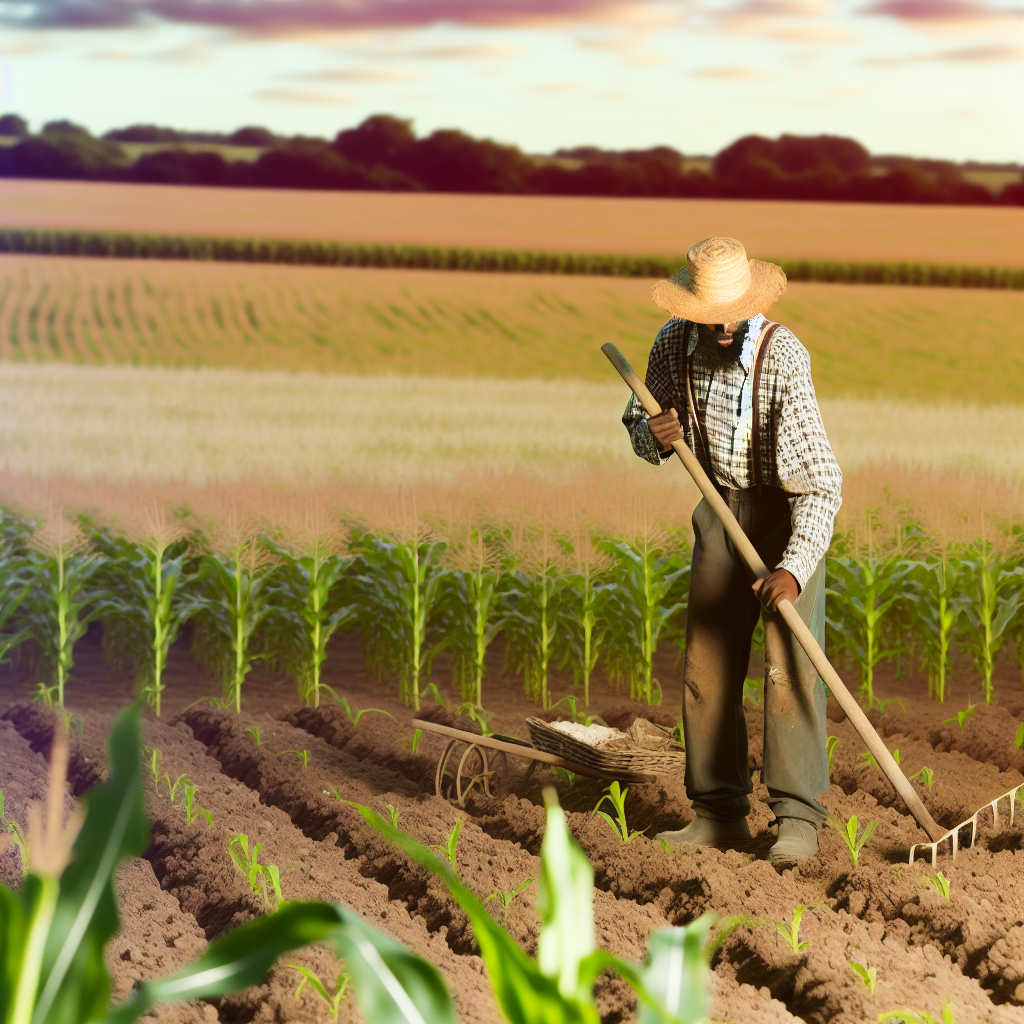Introduction
With the increasing need for agricultural labor jobs, there is a growing opportunity to support veterans in this sector.
It is crucial to provide opportunities and support for veterans in agricultural labor jobs for a variety of reasons.
Brief explanation of the topic
Many veterans face challenges transitioning back into civilian life after their military service.
Finding stable employment can be a struggle, but agricultural labor jobs offer a promising avenue for veterans to utilize their skills and contribute to society.
Importance of providing opportunities and support for veterans in agricultural labor jobs
Supporting veterans in agricultural labor jobs not only helps them secure meaningful work but also addresses labor shortages in the agricultural sector.
These jobs offer a sense of purpose and connection to the community, which can significantly benefit veterans’ mental health and well-being.
Additionally, veterans bring unique skills and experiences to these roles, such as discipline, resilience, and problem-solving abilities, making them valuable assets to the agricultural workforce.
By providing opportunities and support for veterans in agricultural labor jobs, we are honoring their service to the country and helping them successfully transition into civilian life.
Overview of Agricultural Labor Jobs for Veterans
Transitioning from military service to civilian life can be a challenging process for veterans.
However, opportunities abound in the agricultural industry for those looking for a new career path.
Agricultural labor jobs provide veterans with a sense of purpose, community, and the chance to continue serving their country in a different capacity.
Types of Agricultural Labor Jobs Available
There are a variety of agricultural labor jobs that veterans can explore.
These include positions such as farm laborers, equipment operators, crop consultants, livestock caretakers, and agricultural technicians.
Each of these roles plays a vital part in ensuring the success of agricultural operations.
Benefits of Working in the Agricultural Industry
Working in the agricultural industry offers numerous benefits for veterans.
These include opportunities for career advancement, competitive wages, job stability, and the chance to work outdoors.
Additionally, veterans can develop new skills and knowledge that can be applied to other areas of their lives.
Skills and Experiences That Veterans Can Bring to These Jobs
Veterans possess a unique set of skills and experiences that make them well-suited for agricultural labor jobs.
These include leadership abilities, problem-solving skills, teamwork, discipline, and a strong work ethic.
Veterans also have experience working in high-pressure environments, which can be beneficial in the fast-paced world of agriculture.
Transform Your Career Today
Unlock a personalized career strategy that drives real results. Get tailored advice and a roadmap designed just for you.
Start NowChallenges Faced by Veterans in Transitioning to Agricultural Labor Jobs
Transitioning from military service to civilian life can be a daunting task for veterans.
Finding employment in new industries such as agriculture can be particularly challenging.
Here are some of the challenges that veterans may face when trying to enter the agricultural labor market:
- Lack of Knowledge and Experience in the Industry
- Physical and Mental Health Issues
- Difficulty in Obtaining Necessary Certifications and Licenses
Veterans may lack the necessary knowledge and experience in agriculture.
This lack of familiarity can make it difficult for them to compete with candidates who have been working in the industry for years.
This can be a significant barrier to entry for veterans looking to start a career in agricultural labor.
Many veterans face physical and mental health issues as a result of their service.
These health issues can impact their ability to perform physically demanding tasks required in agricultural labor jobs.
As a result, it can be challenging for veterans to secure employment in this field.
For those looking to work in specialized roles within the agricultural industry, obtaining necessary certifications and licenses can be a hurdle.
Without the required credentials, veterans may find it hard to find employment in certain sectors of the industry.
It is essential for organizations and government agencies to provide support and resources to help veterans overcome these challenges.
This support can lead to successful transitions to agricultural labor jobs.
By offering training programs, mentorship opportunities, and assistance with certification processes, veterans can build their skills and confidence.
This is vital for thriving in this new career path.
Furthermore, creating partnerships between veterans’ organizations, agricultural businesses, and educational institutions can help bridge the gap.
Collaborating on outreach initiatives, job fairs, and networking events can connect veterans with potential employers.
This connection can provide valuable insights into the agricultural industry.
With the right support and resources, veterans can overcome the challenges they face.
Showcase Your Business Today
Reach thousands of readers actively exploring professional services. Publish your business profile and grow your audience now.
Publish NowFinding fulfilling and rewarding careers in this dynamic industry is crucial for their successful transition.
See Related Content: Innovative Irrigation Techniques for Specialists
Support Programs and Resources for Veterans in the Agricultural Industry
Transitioning from military service to civilian life can be challenging for veterans.
However, there are various support programs and resources available to assist them in entering the agricultural industry.
These programs aim to provide opportunities for veterans to use their skills and experience in a new and fulfilling career path.
Government Programs
- The VOW to Hire Heroes Act is a federal program that provides tax credits to employers who hire veterans.
- Through this program, veterans can gain access to job opportunities in the agricultural sector and receive the support they need to succeed.
- Employers in the agricultural industry can benefit from hiring veterans by tapping into a pool of talented and dedicated individuals.
Non-Profit Organizations
- The Farmer Veteran Coalition is a non-profit organization that offers support and resources to veterans interested in agriculture.
- They provide mentorship programs, grants, and networking opportunities to help veterans start their own farming businesses.
- By joining the Farmer Veteran Coalition, veterans can connect with other veterans in the industry and learn from their experiences.
Vocational Training and Education
- Many veterans may not have previous experience in agriculture but are eager to learn and start a career in this field.
- Vocational training programs and educational opportunities can help veterans acquire the necessary skills and knowledge.
- These programs often offer hands-on training and certification, preparing veterans for various roles in the agricultural industry.
The support programs and resources available for veterans in the agricultural industry play a crucial role in helping veterans transition into a new career path.
By taking advantage of these opportunities, veterans can find meaningful employment and contribute to the growth of the agricultural sector.
Find Out More: Understanding Irrigation Scheduling and Management
Success stories of veterans in agricultural labor jobs
John Smith, a former Marine, found fulfillment in farming after transitioning out of the military.
Sarah Johnson, an Army veteran, now runs a successful organic vegetable farm in rural America.
Mike Martinez, a Navy veteran, started his own landscaping business and found peace working outdoors.
Profiles of veterans who have successfully transitioned into the agricultural industry
Tom Wilson, an Air Force veteran, now manages a large-scale dairy farm in the Midwest.
Jessica Green, a Coast Guard veteran, decided to pursue a career in beekeeping and has thrived.
David Brown, an Army National Guard veteran, found his passion in vineyard management and is excelling.
Benefits they have experienced from working in these jobs
Veterans have reported a sense of purpose and fulfillment in working the land.
Many find solace in the peacefulness of rural settings and nature.
The physical labor involved provides a healthy outlet for stress and anxiety.
How they have overcome challenges
Veterans often face a learning curve when transitioning to agriculture but persevere.
Support from veteran programs, agricultural organizations, and fellow farmers has been crucial.
Some have sought additional training and education to enhance their skills in the industry.
Find Out More: Success Stories from Extension Agent Initiatives

Tips for veterans interested in pursuing agricultural labor jobs
Research different types of agricultural labor positions.
Consider the skills and interests you already have that could transfer to this field.
Look for job training programs specifically designed for veterans.
Researching job opportunities in the agricultural industry
Explore job boards specific to agricultural labor positions.
Attend job fairs and industry events to network with potential employers.
Reach out to local farmers and agricultural businesses to inquire about job openings.
Networking with veterans who have successfully transitioned
Join veteran-focused agricultural organizations and groups.
Connect with veterans who have made the transition through social media platforms.
Attend veteran networking events and conferences to meet others in the field.
Seeking out support programs and resources
Look for government programs that offer job training and placement assistance.
Explore non-profit organizations that support veteran employment initiatives.
Consider enrolling in agricultural education programs to enhance your skills.
By following these tips, researching job opportunities, networking with other veterans, and seeking out support programs, veterans can successfully transition into agricultural labor jobs with confidence and support.
See Related Content: Understanding Veterinary Technician Licensing
Opportunities for Veterans in Agriculture
Agricultural labor jobs provide opportunities for veterans to transition into a fulfilling career.
With the right support and training, veterans can excel in this industry.
Summary of Key Points
Agricultural labor jobs offer veterans a chance to continue serving their country through the important work of farming and food production.
Veterans interested in pursuing agricultural labor jobs can benefit from specialized training programs and support services available to assist in their transition.
Call to Action
If you are a veteran looking for a new career path, consider exploring opportunities in agricultural labor.
Showcase Your Business Today
Reach thousands of readers actively exploring professional services. Publish your business profile and grow your audience now.
Publish NowReach out to local organizations and programs that provide support for veterans in this industry.
Importance of Ongoing Support
It is crucial to provide ongoing support and opportunities for veterans in the agricultural labor sector.
By doing so, we honor their service and help them succeed in a new chapter of their lives.
Additional Resources
Summary of the Major Laws of the Department of Labor | U.S. …
[E-Books for Sale]
The Big Book of 500 High-Paying Jobs in America: Unlock Your Earning Potential
$19.99 • 500 High-Paying Jobs • 330 pages
Explore 500 high-paying jobs in America and learn how to boost your career, earn more, and achieve success!
See All 500 High-Paying Jobs of this E-Book
1001 Professions Without a Degree: High-Paying American Jobs You Can Start Now
$19.99 • 1001 Professions Without a Degree • 174 pages
Discover 1001 high-paying jobs without a degree! Unlock career tips, skills, and success strategies for just $19.99!




